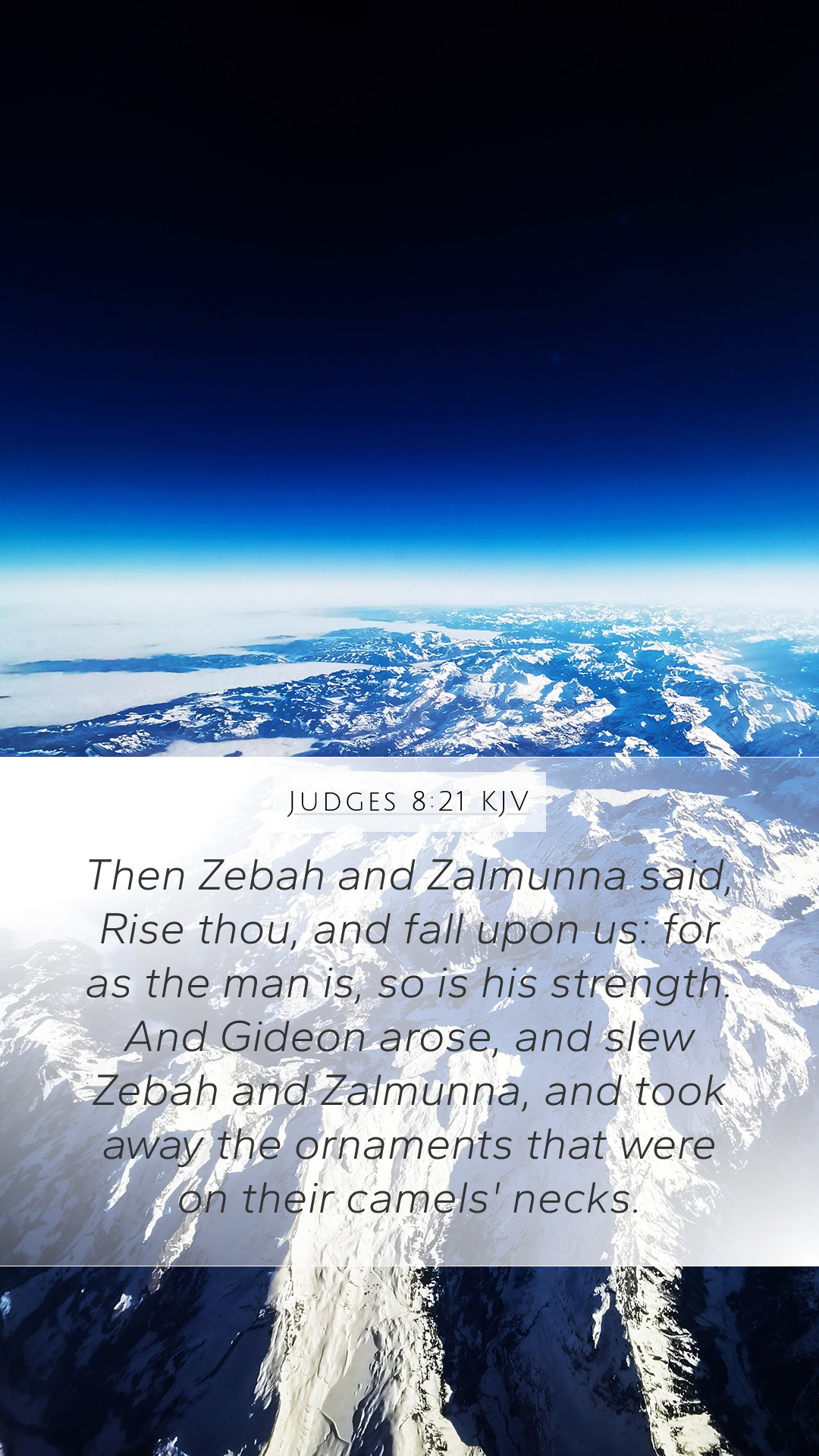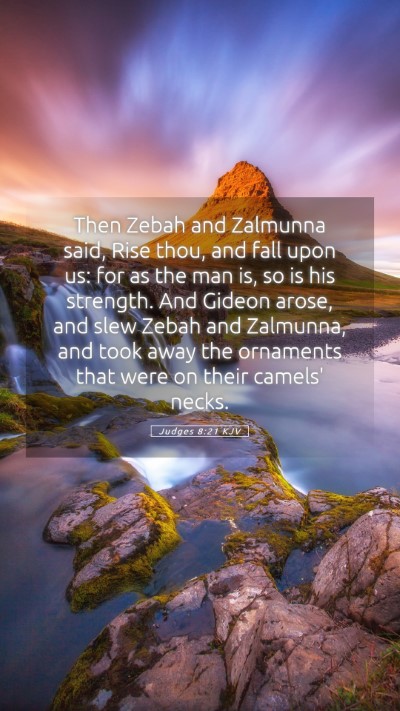Bible Verse Meaning and Commentary on Judges 8:21
Judges 8:21 (KJV): "Then Zebah and Zalmunna said, 'Rise thou, and fall upon us: for as the man is, so is his strength. And Gideon arose, and slew Zebah and Zalmunna, and took away the ornaments that were on their camels' necks."
Summary of Meaning
This verse presents a climactic moment of justice and retribution in the narrative of Gideon and his battle against the Midianites. The demand of Zebah and Zalmunna for Gideon to slay them reflects their recognition of his strength and the inevitability of their defeat. Gideon, fulfilling justice, not only kills the kings but also removes the adornments from their camels, a symbolic act that signifies the removal of the glory and power of the enemies of Israel.
Insights from Public Domain Commentaries
Matthew Henry's Commentary
Matthew Henry notes that this passage underscores the principle that the strength of a king or leader is equated with the character and capability of the man himself. The call of Zebah and Zalmunna is also indicative of their desperation in the face of defeat. Gideon's act of slaying them serves as a divinely sanctioned punishment for their oppression of Israel. Furthermore, the earrings and ornaments symbolize the wealth and pride of the Midianites, which Gideon strips away, illustrating the restoration of Israel's honor.
Albert Barnes' Notes
Albert Barnes emphasizes that the phrase "as the man is, so is his strength" illustrates a common belief in the ancient Near East where character and power are closely linked. The execution of Zebah and Zalmunna represents God's justice against those who perpetuate evil and oppression. Barnes also highlights the importance of the ornaments, noting that they served as a trophy of victory and a reminder of the defeated enemy's power, now rendered null.
Adam Clarke's Commentary
Adam Clarke offers a reflective analysis on the irony of the high status of Zebah and Zalmunna compared to their ultimate fate. Their request for Gideon to kill them spurred both a realization of their weakness and his power. Clarke articulates that by killing the two kings, Gideon delivered Israel from their oppressive hand, symbolizing the divine deliverance that the Lord provides to His people. The ornaments taken from the camels serve as a symbol of the spoils of war, which are significant in Biblical narratives of victory.
Lessons and Themes
- Justice and Retribution: The execution of the Midianite kings illustrates God's justice in punishing evildoers.
- Recognition of Strength: The acknowledgment by Zebah and Zalmunna of Gideon's strength signifies a broader truth about the power of God working through His chosen leaders.
- Symbolism of Ornaments: The removal of ornaments signifies the defeat and humiliation of the enemy.
- Empowerment through Divine Support: Gideon's victory showcases the empowerment and support God provides to His people.
Related Bible Cross References
- Hebrews 11:32-34: The hall of faith references Gideon and his accomplishments through faith.
- 1 Samuel 15:33: King Saul’s act of killing Agag echoes the theme of divine justice against enemies.
- 2 Samuel 8:2: David's conquests and the restoration of Israel relate similarly to Gideon’s achievements.
Application to Life
This verse encourages readers to reflect on the concept of divine justice and the assurance that God’s power prevails over evil. It serves as a reminder of the importance of faithfulness to God, who empowers His people to overcome adversity.
Conclusion
In Judges 8:21, we find rich theological implications regarding strength, justice, and God's deliverance. This verse not only recounts a historical event but also offers profound insights that can be applied to personal faith and understanding of divine power in daily life. For those seeking deeper Bible verse meanings, interpretations, and commentaries, studying this passage reveals significant lessons valuable for Bible study groups, online Bible study sessions, or individual reflection.


